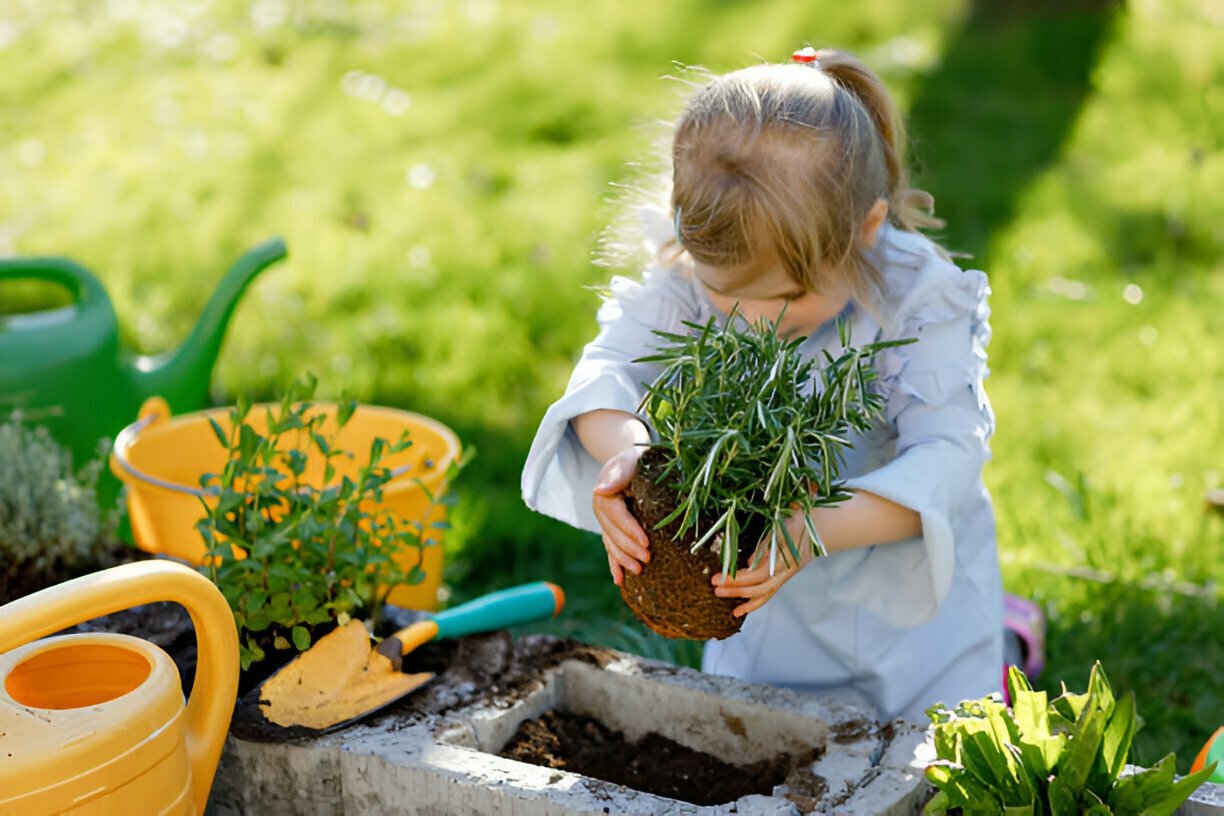Table of Contents
When I was in school, I remember my mother used to introduce me to various vegetables regularly. My mother had a vegetable garden, and we collected most of the vegetables from the garden. She used to take me to the garden and take care of it. Since then, I developed a love for plants. I used to go to school and pick the plants and weeds that grew there and plant them in the garden. But my mother always introduced me to the plants and vegetables that were suitable for planting in our garden. Do you want to get the younger members of your household involved with gardening? We have tried to describe 10 important benefits of how effective gardening is for children and why you should teach your kids gardening.
1. To mix them with nature
Get your little members of the house into the habit of interacting with nature outside the home. This will increase their thinking power to understand what is happening in nature and why it is happening.
Gardening brings young children closer to nature every year. There is an opportunity to think and research about the nature of the child. If you have plants at home, take them to them and try to give them ideas about plants. Children can remember objects or anything they see with their own eyes for a long time. A great way to adjust to nature is to involve children in gardening.
Children raised with nature grow up to have clear ideas, research, review, and deep thinking about nature.
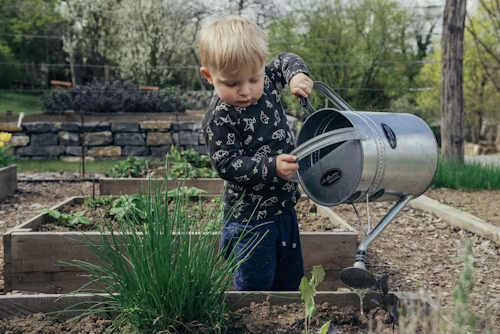
2.Kids gardening to teach responsibility and patience
Children are very emotional and easily upset. Get kids involved in gardening to build patience and responsibility.
Regular watering, growing, pruning, and weeding of garden plants will instill responsibility in your child.
The habit of going to the garden every day will become a part of their daily routine. Children will work in the garden out of a sense of responsibility.
Parents or elders should remind children about their responsibilities. Gardening can be a great way to practice responsibility and patience. Research shows that responsible and patient people thrive and succeed in their lives.
You have to practice the actions for your child’s future welfare from an early age. Regular practice helps people move forward.
3. Encourages healthy eating
Many children are seen not wanting to eat vegetables, fruits along herbs. Because they are not practiced from childhood. They are addicted to junk food, which is very harmful to health. A home source of nutritious food is your kitchen garden or raised beds.
By having a garden, you can regularly produce vegetables, herbs, and some fruits from there and your children watch the crops grow from small to large. They become accustomed to these crops and can include vegetables and herbs in their daily diet, ensuring that your child eats healthy food.
When you take your little ones to the garden, you can pick fresh fruit from the trees and give it to your little ones to eat.
Health-conscious parents grow nutritious food grains for their children in their gardens, and their children’s health improves by feeding them these foods. Children do not suffer from malnutrition, and their bodies and skin are healthy.

4. To reduce device addiction
We know from research that on average one in two children is addicted to digital screens. Just imagine how scary it is going to be when the addiction to digital skin can take our children. To be honest, it is very painful, but the truth is that children are spending time on video games, computers, or mobiles instead of using their intellectual powers.
To reduce your child’s addiction to devices, you can encourage them to take up gardening. Working in the garden allows them to become familiar with greenery and connect with the nature around them.
Studying, nutritious food, moderate rest, and leisurely gardening habits will help your child reduce their exposure to digital screens.
It will improve the psychological aspect of the children and get rid of eye and headache problems.
5. To increase immunity
Keeping the garden soil clean, watering, caring for the plants with your own hands, cleaning, etc. will protect you from disease.
By developing the habit from childhood, the problem of skin irritation, allergy, or sneezing will not arise. Let your children play with the garden soil as they learn and adapt.
Regular consumption of herbs like basil, mint, rosemary, sweet basil, sage, thyme, etc. will increase the immunity of your children. Try getting your kids to plant these herbs themselves and pick them when they are ready to harvest so they get excited to eat them.
Also, home-grown vegetables are nutritious. We should keep 40-50 percent of fruits and vegetables in our daily diet; it will keep our bodies healthy and increase immunity.
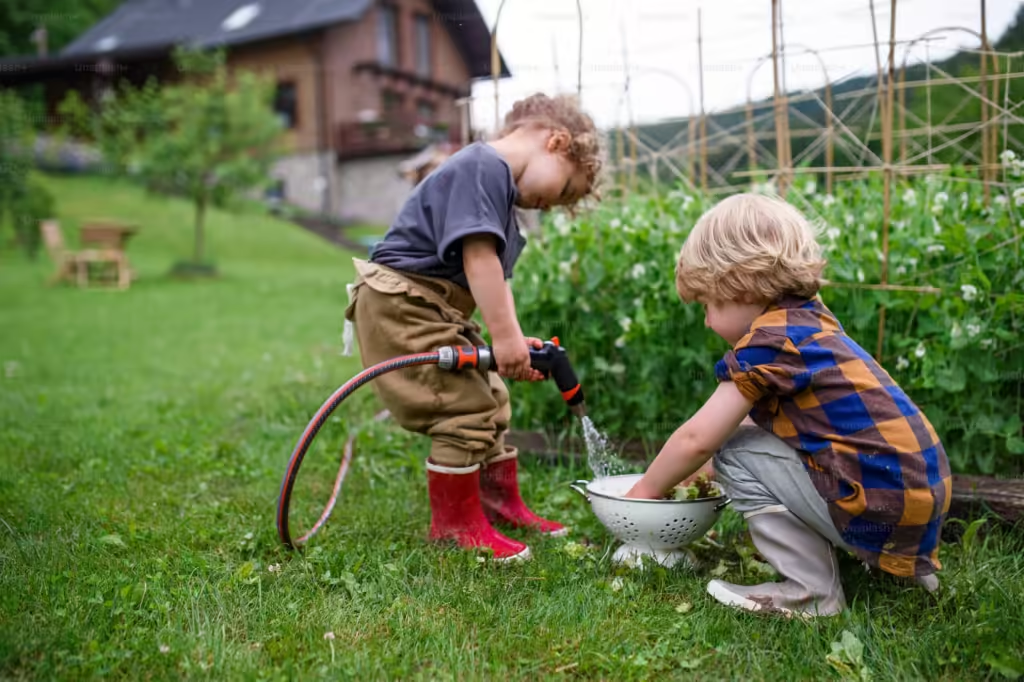
6. To raise creativity
Children’s creativity develops through gardening. Children will become creative by playing games and practicing plants in the garden. Making soil, paving garden beds, making garden beds, and tools to help with gardening are made for your children to see and learn about.
You can set aside a space for your kids to grow plants and say this space is yours here you can grow as you wish. Then the children will try and try gardening from their knowledge which will gradually lead them to be creative.
Use your leftovers for gardening and let your kids learn and practice. They can learn how to make use of things that are lying around or are not working at home. This will develop their creative talent.
7. To grow confidence
When children grow seedlings from seeds and sprout from seeds, they will see it with their own eyes, making observations that will increase their confidence several times. They will again be encouraged to produce seedlings for sowing seeds.
Regularly engaging children with the garden will help them gain experience in gardening and growing their seedlings. Seeing parents will encourage them to work and by doing this, they will develop self-confidence. In reality, these children will be encouraged to work with confidence when they grow up and move on.
To boost your children’s confidence, introduce them to your garden and encourage them to work in the garden.
8. To improve mental health
Children will be in good spirits after seeing seedlings grow from regularly gardening seeds, picking flowers and fruits, and working in the garden regularly.
Seeing their plants flourishing and bearing fruit will make them happy. Children are happy with small things that affect them emotionally.
Let children work in the garden for psychological development. Being mentally healthy will enable them to focus more on their thinking and studies.
Let kids work in the garden to relieve stress and cheer up their minds. By working, they will developmentally.
Parents should encourage gardening for the benefit of their mental health.
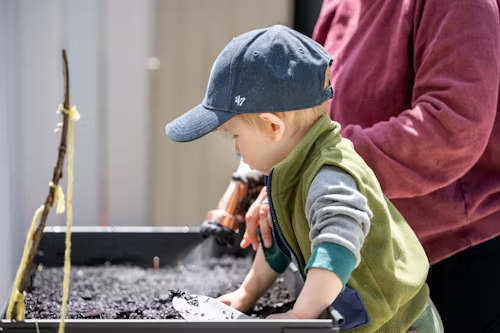
9. To make them learning new things
Children are more interested in learning new things. They show interest in everything around us. Take the little ones to the garden. Taking them to the garden can be seen as they will keep asking you questions rather than bothering them if you convince them the kids will be interested in learning more.
Introduce new plants and tell them why you are watering them and when not to water them. Children’s intellectual powers are sharp and these things which they learn with pleasure are long remembered. By meeting new people, they will learn all about gardening.
10. To grow environmental awareness
As humans, we are not far from nature but we have created distance ourselves. We don’t want to mix with nature and we don’t want to work for the benefit of nature. As nature is helping us with everything, we should think and help them.
Encourage your kids to garden from an early age to raise their understanding of the environment. Through free association with nature, they acquire the ability to think about nature. By gardening, they can learn what is harming their environment and what is not. Using any material is harming the plants and us. Trees teach us to think about how important nature is.
Encourage your kids to learn about gardening and the natural world. I think these ten benefits will encourage your children to take up gardening.
Don’t pressure your kids into gardening. Let them do whatever they want. Children put their full effort into what they are interested in. If you force them or apply pressure, they will not want to do it.
Teach kids to grow microgreens
Microgreens may be the easiest exercise for young children. Kids can produce in just a few steps anywhere, indoors and outdoors. Microgreen worms are available in stores so it is very easy to produce microgreens.
The first step in teaching kids to grow plants can be by growing microgreens. The production and harvesting time of microgreens are very limited so they can easily observe the process. They can see how seedlings grow from seeds. They can also see how the sprouts grow from the seed and what color they look like.
How long are the microgreens, and how long are the micro bricks to be harvested, they can know everything, they can practically see everything. Use microgreens in salads at home and get them used to eating microgreens.
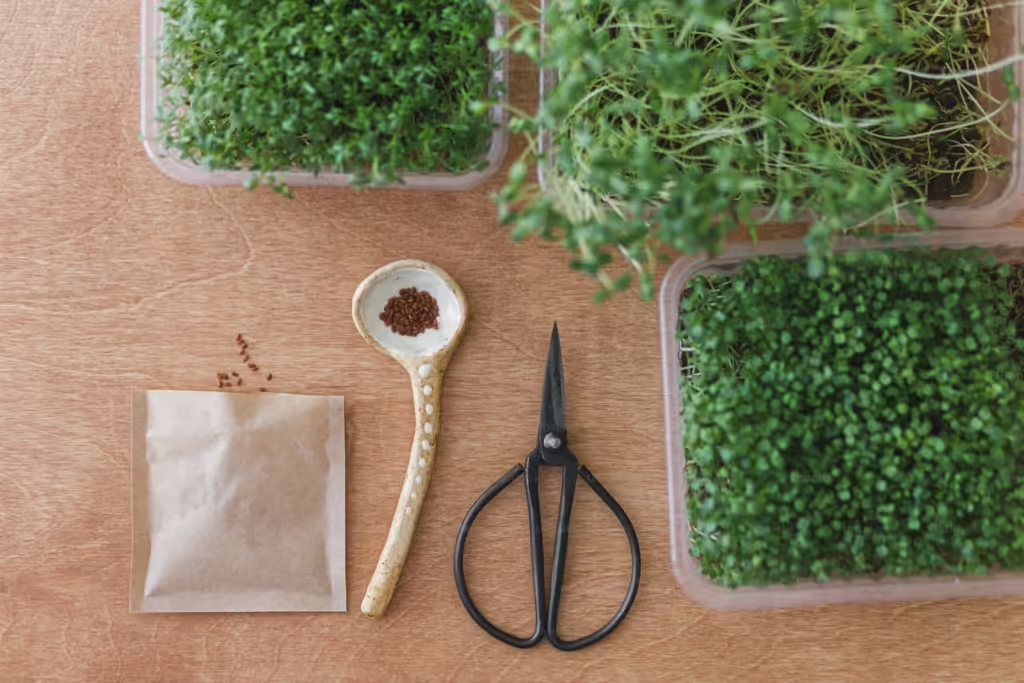
Gardening Safety
I think children should maintain some safety while gardening. If you have plants in your home or backyard that are harmful to children, you should quickly remove them.
If you have small children in your home, they are of age and a very fickle nature, you can keep an eye on them when you take them to the garden, they are more enthusiastic and more curious about everything they can put in their mouths, from soil to poisonous substances.
You should keep an eye on children. After applying fertilizers and pesticides, keep them out of the reach of children. If you have a swimming pool near your home or garden, keep the swimming pool door closed so they can’t get in alone.
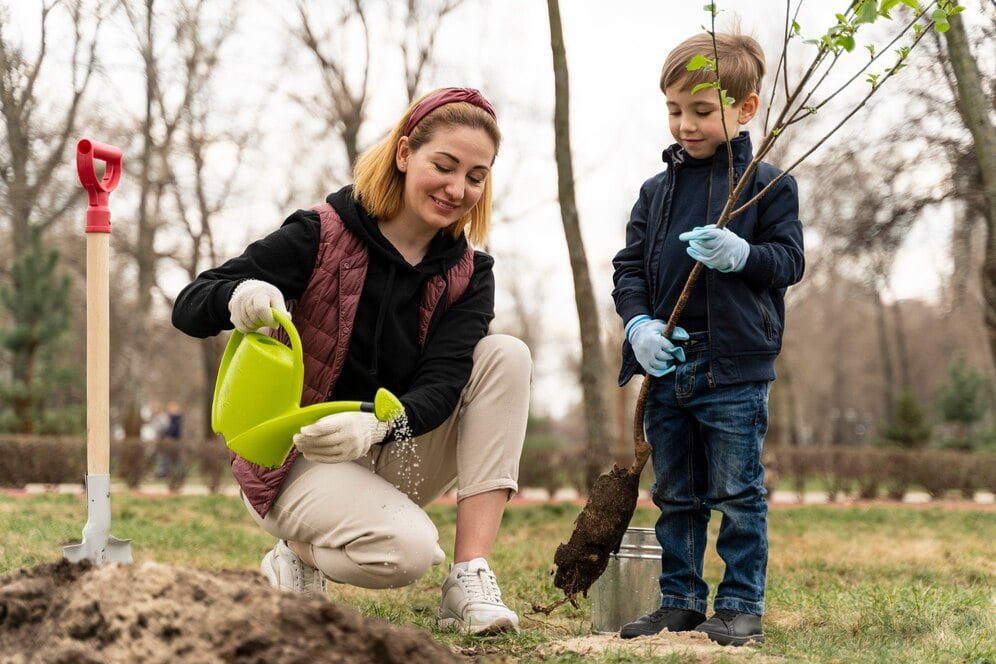
Tips
1. Buy small children any gardening books you can find and ask them to read them. This will increase their interest in gardening.
2. Buy garden tools for young children and have them use them. Allow children to use these gardening equipment. They can easily carry the tools and use them in the garden. Also, these tools are not sharp or harmful.
3. Instead of buying them water cans, buy water fountains, and don’t pour too much water while watering. Take the little ones to the nursery to pick the plants, this will increase their interest in choosing the plants they like and bringing them home to take care of.
4. Place them in front of you while planting any tree at home or plant the seedlings with their hands. There will be experience in planting saplings.
5. When you see insects in your garden, don’t forget to introduce them, children will easily recognize the insects and be vocal about them.
6. If you have children at home, try to make the gardening beds you decide to build a little lower in height so that your children can easily take care of them and keep a close eye on them.
Facebook
X
LinkedIn
Pinterest
Telegram
Reddit
Email
WhatsApp
